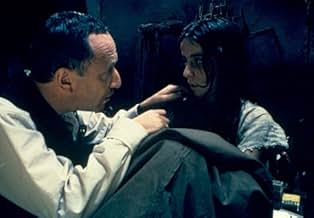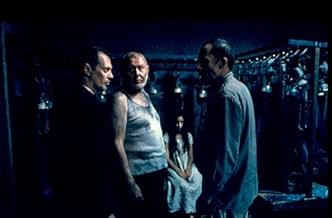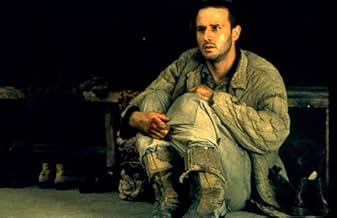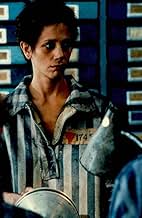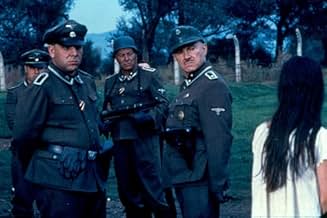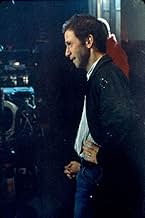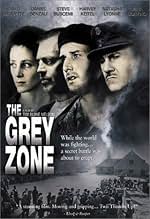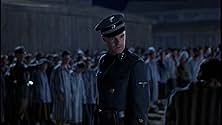Un médico nazi, junto con el Sonderkommando, judíos que son obligados a trabajar en los crematorios de Auschwitz contra sus compañeros judíos, se encuentran en una zona moral gris.Un médico nazi, junto con el Sonderkommando, judíos que son obligados a trabajar en los crematorios de Auschwitz contra sus compañeros judíos, se encuentran en una zona moral gris.Un médico nazi, junto con el Sonderkommando, judíos que son obligados a trabajar en los crematorios de Auschwitz contra sus compañeros judíos, se encuentran en una zona moral gris.
- Dirección
- Guión
- Reparto principal
- Premios
- 1 premio y 3 nominaciones en total
- Lowy
- (as Georgy Zlatarev)
- Anja
- (as Lisa Benavides)
- Woman Inmate
- (as Dafina Katzarrska)
Reseñas destacadas
An unthinkable,unconscionable deal has been worked out between a certain group of Nazi death camp inmates and their captors: in order to avoid the ovens(in all likelihood,only temporarily),these inmates would use their talents(among them,musical) to placate and ease along the funneling of other Jews and "undesirables" into the death chambers. A strong cast and an even stronger screenplay/script is augmented by very intelligent cinematography. Particularly good turns by David Arquette,Steve Buscemi,Daniel Benzali and Mira Sorvino as the inmates,all desperate,all convinced of what they have to do to survive and in Arquette's character's case,not even certain if it is even worth it.
It would be tempting to slam "Schindler's List" after seeing this,but I won't. SL is meant as an epic,a tribute,a story of the upside of surviving through the most dense of human tragedy,whereas GZ is a decidedly darker exploration of what happens to people in the same situation but are pushed into much less noble,much more selfish and desperate devices. Both are strong examples of the genre,but where GZ triumphs is that that it explores the most damning actions through the consciences of people faced with decisions that nobody should have to make. It is an unflinching portrait of a dark chapter in human history,rife with detail and completely lacking of lecturing. THis film is for anyone who wants to see an unvarnished and stark portrayal of the human condition brought to its lowest denominator. A must-see for college classrooms and Holocaust museums anywhere!
There are several reasons you must see this film. First, it is based on the diary of Dr. Miklos Nyiszli, a Hungarian Jew chosen by Josef Mengele to be the head pathologist at Auschwitz. And it dramaticizes the true attempt by Sonderkommandos to destroy the Auschwitz gas chambers.
Second, it focuses on ethical dilemnas faced by Dr. Nyiszli and the various Sonderkommandos who are trying to save themselves, their families, or ... just someone ... anyone. To say that these men were "co-opted" by the Nazis is to ignore the horror of the coercion, debasement and dehumanization that the Nazis inflicted -- not only on their prisoners, but upon themselves. One can imagine that some Sonderkommandos were selfish -- just as some Kapos were cruel and some doctors who assisted the Nazis were accomplices. But the question remains -- what would you have done in the face of such coercion and duress?
Third, the film -- based on Tim Blake Nelson's play -- is not the typical Holocaust film. There is very little redeeming behavior. There is no uplifting ending. The grey zone of moral ambiguity is presented as a cold, unfeeling, horrifying place -- where you are damned if you do, and damned if you don't -- which means that they are all damned! For the first third of the film, the script is obtuse, confusing, and disconnecting -- as it should be, considering that we may as well be taking the point of view of someone who just arrived on a train and entered the gates of hell. How can any of this make sense? In the opening scene, the Doctor is asked to save the life of a Jew who attempted suicide. How absurd can that be -- to save the life of someone who will sooner rather than later be murdered by the Nazis anyway?!
In conclusion, the play/film contains dialogue and scenes that are memorable. This is one of my favorites. One Jewish leader is demanding that they destroy the gas chambers as soon as possible. But another Jewish leader is still planning on escape, arguing that he has every right to expect to live. The first leader replies, something to the effect that, after what he has seen and done, he does not want to live!
Today is Holocaust Memorial Day, April 18, 2004. Last night, after seeing a Holocaust documentary on Kurt Gerron ("Prisoner of Paradise") a friend of mine asked me what I would have done? I told her that it would depend on whom I was caring for -- my wife and my daughters -- my parents. It was then that I realized that I would have probably done everything that every Jew did during the Holocaust. I would have tried to save myself and my family. I would have abandoned others -- even betrayed others. I would have killed. I would have fought the Nazis. And I would have probably been killed for it. I would have despaired -- tried suicide -- become depressed, useless to everyone. I don't think I would have survived. I think the only question in that regard -- and it shows how irrelevant the question really is -- is "how soon would I have died." That is why I remember Holocaust Memorial Day -- so that I will never forget -- and I can help work towards a time when such a hell will not occur in Europe, in Africa, in the Middle East, in the US, ... anywhere.
It's images are haunting.
Do to its depressing topic and even more disturbing ending others have criticized this movie as not being "entertaining". In fact it is entertaining. It is a horror movie of the real kind. The horror of human evil based on prejudice and hatred.
Everyone needs to see this movie, with the exception of those who lived through it, as they already know!
¿Sabías que...?
- CuriosidadesWriter and Director Tim Blake Nelson made Dr. Miklos Nyiszli's memoirs "Auschwitz: A Doctor's Eyewitness Account" (1946) mandatory reading for the film's cast, along with Primo Levi's "The Drowned and the Saved" (1986) and Filip Müller's "Eyewitness Auschwitz" (1979).
- PifiasAfter the men set the crematoria 4 on fire they tore down the fences and fled into the woods. They barricaded themselves in a barn where SS caught them. They were burned alive inside the barn.
- Citas
Hoffman: I used to think so much of myself... What I'd make of my life. We can't know what we're capable of, any of us. How can you know what you'd do to stay alive, until you're really asked? I know this now. For most of us, the answer... is anything. It's so easy to forget who we were before... who we'll never be again. There was this old man, he pushed the carts, and on our first day, when we had to burn our own convoy, his wife was brought up on the elevator. Then his daughter... and then both his grandchildren. I knew him. We were neighbors. And in 20 minutes, his whole family, and all its future, was gone from this earth. Two weeks later, he took pills and was revived. We smothered him with his own pillow, and now I know why. You can kill yourself. That's the only choice. I want them to save you. I want them to save you more than I want anything. I pray to God we save you.
- ConexionesFeatured in WatchMojo: Top 10 Holocaust Films (2014)
- Banda sonoraRoses from the South Op. 388
(1880)
Composed by Johann Strauss (as Johann Strauss)
Orchestrated and arranged by Jeff Danna and Andrew Lockington
Performed and conducted by members of the Bulgarian Symphony Orchestra
Selecciones populares
- How long is The Grey Zone?Con tecnología de Alexa
- Is this film based on a book?
- What is the Nazi officer pouring into the vents on top of the gas chamber?
- How did the girl survive in the gas chamber?
Detalles
- Fecha de lanzamiento
- País de origen
- Sitio oficial
- Idiomas
- Títulos en diferentes países
- The Grey Zone
- Localizaciones del rodaje
- Empresas productoras
- Ver más compañías en los créditos en IMDbPro
Taquilla
- Presupuesto
- 5.000.000 US$ (estimación)
- Recaudación en Estados Unidos y Canadá
- 517.872 US$
- Fin de semana de estreno en EE. UU. y Canadá
- 24.526 US$
- 20 oct 2002
- Recaudación en todo el mundo
- 621.592 US$
- Duración1 hora 48 minutos
- Color
- Mezcla de sonido
- Relación de aspecto
- 1.85 : 1
Contribuir a esta página



